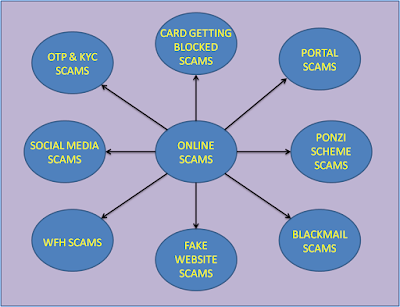Protect Yourself from Online Scams: Identifying and Avoiding Common Threats
With the increasing prevalence of internet usage, online scams have become a significant threat to individuals and businesses alike. Scammers have evolved their tactics to deceive users and steal sensitive information, money, and personal data. In this post, we will explore various online scams, including OTP, KYC, card getting blocked, job, matrimonial portal, social media, work from home, eCommerce website, quick money making scheme, blackmailing, and more. Moreover, we'll provide essential tips to identify these scams and precautionary measures to protect yourself from falling victim.
OTP and KYC Scams:
Scammers use fake messages, emails, or phone calls to trick individuals into revealing their One-Time Passwords (OTPs) and Know Your Customer (KYC) details. These can lead to unauthorized access to accounts or identity theft. Remember, legitimate organizations will never ask for your OTP or KYC over the phone or email.
Safety Tips:
1. Never share your OTP or KYC details with anyone, including customer support representatives.
2. Be cautious when receiving unsolicited messages or calls asking for sensitive information.
Card Getting Blocked Scam:
Scammers impersonate bank officials, claiming your credit/debit card will be blocked, and they need your card details to resolve the issue. Sharing such details can lead to unauthorized transactions.
Safety Tips:
1. Never provide your card details to unsolicited callers.
2. Contact your bank directly using official contact information if you receive such calls.
Job and Matrimonial Portal Scams:
Scammers create fake job postings or profiles on matrimonial portals to collect personal information, exploit job seekers, or deceive people seeking life partners.
Safety Tips:
1. Verify the authenticity of job postings and employers before sharing your personal data.
2. Cross-check details and do thorough research before connecting with someone on a matrimonial portal.
Social Media Scams:
Scammers use social media to spread misinformation, impersonate others, and trick users into clicking malicious links or revealing sensitive information.
Safety Tips:
1. Be cautious of friend requests or messages from unknown individuals.
2. Avoid clicking on suspicious links, and verify the authenticity of shared content before sharing or engaging with it.
Work from Home Scams:
Scammers entice individuals with promises of easy money while working from home. They may ask for an upfront fee or personal information.
Safety Tips:
1.Research the company and read reviews before investing time or money in any work-from-home opportunity.
2. Be skeptical of opportunities that sound too good to be true.
eCommerce Website Scams:
Scammers create fake eCommerce websites, offering products at unrealistically low prices. Victims end up paying for products that never arrive.
Safety Tips:
1. Buy from reputable eCommerce websites with secure payment options.
2. Check for HTTPS and padlock symbols in the website's address bar to ensure secure connections.
Quick Money Making Schemes:
Scammers lure individuals into get-rich-quick schemes promising huge returns on investments. These schemes are often pyramid schemes or Ponzi schemes.
Safety Tips:
1. Be wary of investment opportunities that promise unrealistically high returns.
2. Research and seek advice from trusted financial advisors before investing.
Blackmailing Scams:
Scammers may threaten to expose sensitive information or intimate media unless the victim pays a ransom.
Safety Tips:
1. Avoid sharing sensitive or compromising content with strangers online.
2. If you become a victim, report the incident to the appropriate authorities immediately.
Fake Delivery OTP Scam:
In this scam, fraudsters send fake delivery notifications to individuals via email, SMS, or phone calls. The message claims that a package is on its way and asks the recipient to share an OTP to track or confirm the delivery. However, the OTP provided is not related to any genuine delivery and is instead used to gain unauthorized access to the victim's accounts or make fraudulent transactions.
Safety Tips:
1. Be cautious when receiving delivery notifications from unknown or unverified sources.
2. Always double-check the legitimacy of the delivery notification with the actual courier or vendor through their official website or customer support channels.
3. If you receive a delivery notification asking for an OTP, verify the sender's contact details and do not share the OTP without confirming the authenticity of the delivery.
4. Legitimate delivery notifications from reputable companies usually do not require OTPs for tracking or confirmation. So, be skeptical of any such requests.
5. Be aware of common signs of a scam, such as poor grammar, misspellings, or generic greetings in the message.
6. Keep track of your online orders and verify delivery updates through the official website or mobile app of the courier or vendor.
7. Report suspicious delivery notifications or potential scams to the relevant authorities or the company being impersonated.
Here are some general tips to stay safe online and protect yourself from various online scams:
1. Use Strong and Unique Passwords: Create strong passwords that include a mix of uppercase and lowercase letters, numbers, and special characters. Avoid using the same password for multiple accounts.
2. Enable Two-Factor Authentication (2FA): Whenever possible, enable 2FA for your online accounts. It adds an extra layer of security by requiring a secondary verification method, such as a one-time code sent to your phone.
3. Keep Software and Devices Updated: Regularly update your operating system, software, and apps. Updates often include security patches to protect against vulnerabilities.
4. Be Cautious with Links and Attachments: Avoid clicking on links or downloading attachments from unknown sources. Hover over links to check the URL's legitimacy before clicking.
5. Verify Sender Information: Be cautious of emails or messages asking for personal information, money, or OTPs. Verify the sender's identity and contact the company directly if in doubt.
6. Use Secure Websites: Look for HTTPS and a padlock symbol in the address bar when accessing websites for secure connections, especially when making online transactions.
7. Be Wary of Unsolicited Communication: Avoid engaging with unsolicited emails, messages, or phone calls asking for sensitive information or offering suspicious deals.
8. Protect Personal Information: Be mindful of the information you share online, especially on social media platforms. Avoid sharing details like your home address, phone number, or financial information publicly.
9. Review Privacy Settings: Regularly review the privacy settings of your social media accounts and other online platforms to control what information is visible to others.
10. Backup Important Data: Regularly backup your important files and data to a secure external source or cloud storage service.
11. Educate Yourself: Stay informed about the latest online scams and security threats. Knowledge is key to recognizing and avoiding potential dangers.
12. Use Reputable Antivirus and Security Software: Install reputable antivirus and security software on your devices to protect against malware and phishing attempts.
13. Be Careful with Public Wi-Fi: Avoid accessing sensitive information or conducting financial transactions on public Wi-Fi networks, as they may be vulnerable to attacks.
14. Report Suspicious Activity: If you encounter any suspicious activity or believe you have fallen victim to an online scam, report it to the appropriate authorities and your bank or financial institution.
15. Trust Your Instincts: If something feels off or too good to be true, trust your instincts and proceed with caution.
By following these general tips, you can significantly reduce the risk of falling victim to online scams and maintain a safer online experience. Remember, online safety is an ongoing process, and staying vigilant is key to protecting yourself and your personal information from potential threats.Staying safe online is crucial in today's digital world. By being vigilant and following the safety tips mentioned above, you can protect yourself from falling victim to various online scams. Remember, if something seems suspicious, it's better to err on the side of caution and verify the authenticity of the request before sharing any sensitive information. Stay informed, stay safe!
Further Reading :
1. Cyber crime





Comments
Post a Comment